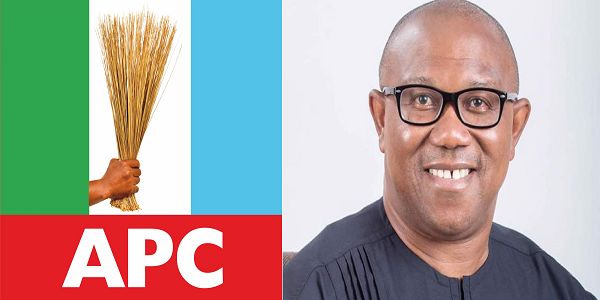The Lagos State chapter of the All Progressives Congress (APC) has criticised the former Labour Party presidential candidate, Peter Obi, over his recent comments on port development in Nigeria, describing him as a leader who speaks without adequate understanding of the issues.
The party said Nigeria needs leaders who think before speaking and not those who confuse populist soundbites for serious policy discussions.
The reaction came after Obi reportedly advised the Federal Government to diversify port development and reduce dependence on Lagos ports, arguing that this would improve trade efficiency and boost economic growth across the country.
However, the Lagos APC dismissed Obi’s position, accusing him of lacking a proper grasp of government policy and the realities of port infrastructure development in Nigeria.
In a statement signed by its Publicity Secretary, Mogaji Seye Oladejo, the party said the administration of President Bola Tinubu does not engage in propaganda but is focused on real governance and strategic national development.
“Although it is widely acknowledged that constructive intellectual engagement remains the major weak point of Mr. Peter Obi, he will do well to carry out in-depth research into any issue he wishes to put in the public domain,” Oladejo said.
“This will help him avoid the legacy of generational embarrassment that comes from shallow, ill-informed commentary dressed up as economic analysis. Nigeria deserves leaders who think before they speak, not those who confuse populist soundbites for policy discourse.”
Oladejo explained that the Renewed Hope Agenda of President Tinubu’s administration is a national development plan, not a regional agenda as critics often claim. He said that the government’s investments in port infrastructure cover multiple regions across the country, not just Lagos.
“From the Bonny Deep Sea Port in Rivers, to the Ibom Port in Akwa Ibom, to the ongoing dredging and rehabilitation of Warri and Calabar Ports — this administration’s commitment is holistic, inclusive, and nationwide,” he said.
He faulted Obi and his supporters for portraying federal investments in Lagos as evidence of regional bias, insisting that Lagos remains a natural hub for trade and commerce due to its strategic location and existing infrastructure.
“Those crying foul over the Lagos Port investment should first pick up a basic economic policy manual before embarrassing themselves further. Governance is driven by strategy, not sentiment,” Oladejo added.
Nigeria’s port system has long been concentrated in Lagos, with the Apapa and Tin Can Island ports handling most of the nation’s cargo traffic. This has led to congestion, inefficiency, and high logistics costs.
In recent years, there have been calls — including from economists and regional leaders — for the federal government to develop more functional seaports in other parts of the country, such as the Niger Delta and South-East, to ease the burden on Lagos.
Peter Obi, during a recent media appearance, had argued that developing other ports outside Lagos would promote national balance and economic growth. He said that countries with multiple operational ports benefit from reduced congestion, increased employment, and improved regional trade.
However, the APC insisted that Obi’s criticism ignored the federal government’s ongoing investments in multiple port projects across the country.
The Tinubu administration’s Renewed Hope economic plan aims to improve infrastructure, attract investment, and create jobs across all sectors. Under this agenda, the federal government has initiated reforms in maritime operations, including digitalisation of port processes and partnerships with private investors to build and modernise seaports.
Oladejo said the Lagos APC remains confident that Tinubu’s leadership will deliver a balanced and prosperous Nigeria.
“President Bola Tinubu and the APC are determined to build a Nigeria that works — one that leaves no region behind. The ongoing reforms in the ports and transport sectors are proof of that commitment,” he said.
Peter Obi, who ran against Tinubu in the 2023 presidential election, has remained one of the government’s most vocal critics, often challenging federal economic and infrastructure policies. His remarks on port development have sparked debate among Nigerians, especially those who believe the South-East has been marginalised in national projects.
The APC, however, maintains that such claims are politically motivated and not supported by facts on the ground.
The Lagos APC concluded its statement by urging politicians to engage in informed discussions rather than populist rhetoric, warning that shallow commentary could mislead the public and distract from genuine development efforts.
“Nigeria’s problems require solutions rooted in knowledge and understanding, not in slogans. We must encourage constructive dialogue, not cheap talk,” Oladejo said.

